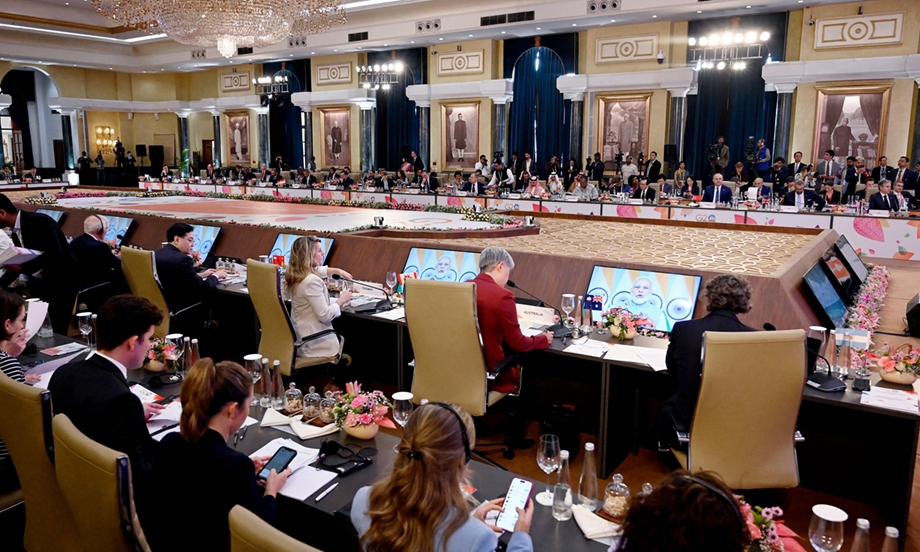Why India worries G20 Foreign Ministers’ Meeting goes ‘off-topic’

Delegates attend the G20 foreign ministers' meeting in New Delhi on March 2, 2023. Photo:AFP
The two-day G20 Foreign Ministers' Meeting was held in India on March 1 and 2, with the participation of representatives of 40 countries and international organizations including foreign ministers of China, Russia as well as US secretary of state. This is also the largest gathering of foreign ministers in G20 history. The recently held G20 Finance Ministers and Central Bank Governors Meeting (FMCBG), as well as the Foreign Ministers' Meeting this time, are both important preparatory meetings for the G20 Leaders' Summit in September this year.
As G20 is the "premier forum for international economic cooperation," the public opinion used to focus more on the FMCBG, but this year's Foreign Ministers' Meeting has received much more attention due to the Russia-Ukraine conflict. Representatives from the US and European countries have tried to turn the Foreign Ministers' Meeting into an anti-Russia meeting. To some extent, this is a manifestation of the Western push for pan-securitization in G20 and its attempt to change G20's original intention. Many developing countries including last year's host of G20 presidency Indonesia, this year's host India, and China all have expressed their concerns and opposition to this trend.
To prevent the Foreign Ministers' Meeting from going off-topic, the host, New Delhi, made preparations in advance by including topics such as climate change, counter-terrorism, energy and food security, and debt issues of developing countries into the agenda, with the aim to make the participants focus on economic cooperation. Indian Prime Minister Narendra Modi in a video speech even bluntly warned that "global governance has failed in both its mandates" - to prevent future wars and to foster international cooperation. This is also the stance of the vast emerging and developing countries that account for more than half of the world's population. These countries generally hope to end conflicts and divisions, and achieve economic recovery in the post-pandemic era as soon as possible.
Unfortunately, like the FMCBG held a few days ago, this G20 Foreign Ministers' Meeting also failed to produce a joint statement. At the G20 Foreign Ministers' Meeting, we have not only seen the severity of global differences, but also felt the paranoid attitude of the US and Western countries in intensifying these differences. Although Secretary of State Antony Blinken and some European foreign ministers said they strongly supported India's G20 priorities, they did not take the host's words seriously, but instead continued to instrumentalize and weaponize G20, using geopolitics to hijack the development agenda that G20 is supposed to focus on.
There are many prominent challenges facing the international economic and development fields at present, and G20 can play a role in many areas. It should be an important platform for solving problems, resolving differences, and promoting cooperation, rather than a stage for political showmanship or quarreling. Every meaningless political slogan or sarcastic accusation at this platform is a waste of this precious opportunity and time. In other words, the global economic cooperation situation is already very fragile and urgently needs new energy. It cannot withstand new disruptions. At this critical moment, each member of G20 has a responsibility to demonstrate political wisdom and a sense of responsibility to seek common ground while putting aside differences.
On March 2, Chinese Foreign Minister Qin Gang delivered a speech at the first session of G20 Foreign Ministers' Meeting, titled "Enhancing Multilateralism and Promoting Global Development," emphasizing the principles of dialogue on an equal footing and consensus-building through consultation, and opposing power politics and even bloc confrontation. He also mentioned specific issues that concern the general well-being of the international community, such as the debt treatment of developing countries, the shareholding review of the World Bank, and the prevention of illegal cross-border traffic of waste. Regarding the crisis in Ukraine, Qin stated that China will always stand on the side of peace, actively promote peace talks, and play a constructive role.
China's statement hits the difficulties and obstacles facing international cooperation at present and proposes constructive solutions with strong relevance, representation and feasibility, which should trigger corresponding joint actions within the G20.
It is worth mentioning that India, G20's rotating chair, has always garnered much attention from Washington. Especially when there is any sign of trouble between India and China, US and Western media is always eager to exaggerate the "divergences" between the two countries. However, at this G20 Foreign Ministers' Meeting, the foreign ministers of China and India held talks and both expressed their firm attitude to support multilateralism, oppose confrontation, and focus on development cooperation on multiple occasions. This also represents the trend of the world and the aspirations of developing countries. If it weren't for the deliberate disruptions by the US and the West, global cooperation like this might have come faster.
We also noticed that at the opening ceremony of the G20 Foreign Ministers' Meeting, all participants observed a minute of silence for the victims of the earthquakes in Turkey and Syria. This was a rare touch of warmth amid the growing division and intensifying confrontation. It shows that transcending differences and engaging in dialogue and cooperation are not only possible, but also have a deep root in international community. We hope that all parties can shoulder their responsibilities, demonstrate cooperation, and contribute to promoting global development and prosperity.








